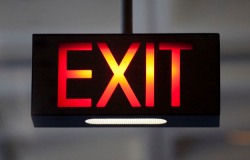2.6 Excluding patrons
|
Licensees and staff must ask an intoxicated person to leave the licensed premises immediately or refused entry into the premises. But did you know that patrons are committing an offence if they try to return to a venue? Read more about the rules for excluding patrons. |
|
Failure to leave
Under the Act the licensee, their staff or security can refuse to admit or ask any person to leave the venue:
-
who is intoxicated, violent, quarrelsome or disorderly
-
whose presence on the licensed premises renders the licensee liable to a penalty under the Act
-
who smokes within a smoke free area as defined by the Smoke-free Environment Act 2000
-
who uses or possesses a prohibited drug while on the premises.
There are exemptions for people remaining in the vicinity (defined to include a radius of 50 metres from the boundary of the licensed premises) for a lawful purpose—e.g. waiting for transport or where they live near the venue.
If a person is refused entry or ejected from licensed premises because they are intoxicated, violent, quarrelsome or disorderly, they are committing an offence if they:
-
attempt to re-enter the premises within 24 hours
-
remain in the vicinity of the premises without a reasonable excuse such as waiting for transport, fearing for one’s safety or the person resides in the vicinity
-
re-enter the vicinity of the premises within 6 hours without a reasonable excuse as above.
A maximum court fine of $5500 applies for each offence. Police and compliance officers also have the option of issuing $550 penalty notices.
If police are continually called to the same premises to assist in removing drunken patrons or enforcing the fail to leave offence, a disciplinary complaint can be taken on the ground that intoxicated persons have frequently been on the premises or have been seen frequently leaving the premises.
In these instances, police could obtain evidence to determine whether the patron was intoxicated while liquor was still being served to that person, and what steps, if any, were taken at the time by staff to remove the patron. This enables police to consider the merits of taking disciplinary action against the venue (or its staff) for intoxication offences, or action against the patron for the failing to leave.
Banning orders
Where a person has been excluded from licensed premises for being drunk, violent or disorderly an application can be made by a licensee, who is a member of the local liquor accord, to the Authority for the person to be banned for up to six months.
In imposing a ban on a patron, the Authority must be satisfied that the person has been repeatedly drunk, violent, quarrelsome or disorderly on or in the immediate vicinity of the premises.
A person banned by the Authority commits an offence if they attempt to enter, or remain in, the licensed premises to which the order relates.
Voluntary exclusions
The law provides for people with a drinking problem to exclude themselves from licensed premises. Licensees are obliged to comply with a request for self-exclusion from a venue.
The person enters an agreement with the licensee by completing an Authority approved form. Once the agreement is entered into, the licensee, or a responsible member of staff, has the authority to prevent the patron from entering the licensed venue, and also remove the patron from the venue. However the onus is on the participant to comply with the terms of the agreement.
In the case of venues that are part of a liquor accord, this exclusion can extend to other venues that are part of that accord if they are specified in the agreement.
